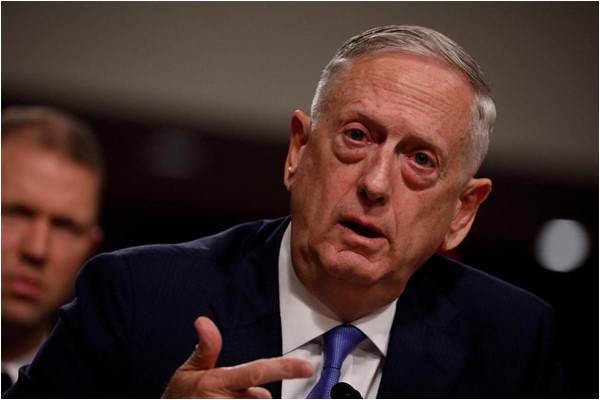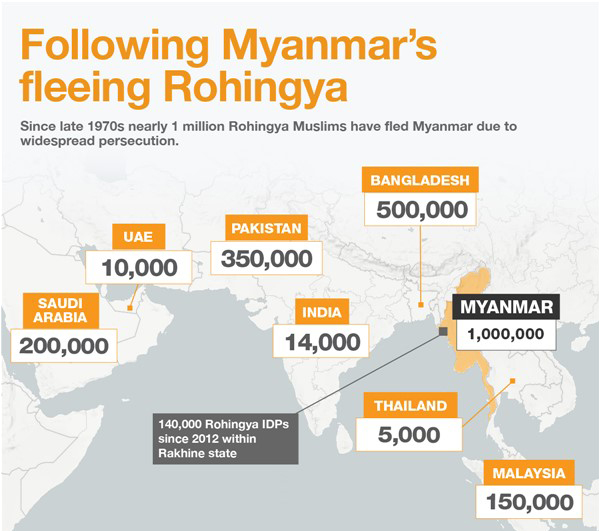
A day before his meeting with Pakistan’s foreign minister, Khawaja Asif, US Defense Secretary Jim Mattis upped the ante by telling a House Armed Services Committee hearing that the administration would try “one more time” to work with Pakistan in Afghanistan before President Trump turned to options to address Islamabad’s alleged support for militant groups. In a separate hearing the same day, Joseph Dunford, chairman of the Joint Chiefs of Staff, minced no words when he said, “it is clear to me that the ISI has connections with terrorist groups.”
This sounded like a replay of 2011, when US Navy Admiral Mike Mullen had told Congress that the Haqqani network was a “veritable arm” of the ISI directorate, followed by the network’s designation as a terrorist organization in 2012.
By implication, the US administration holds Pakistan solely responsible for its as well as President Ashraf Ghani’s woes in Afghanistan. They also believe Pakistan, because of its leverage with the groups, holds the key both to the Taliban’s continued resistance and their participation in the peace talks.
Fundamental irreconcilables
Regardless of what transpires in the Pak-US meetings, it is safe to assume that demand for “action against the Haqqani Network and delivering the Taliban for talks” remains a fundamental irreconcilable constant in Washington’s narrative on Pakistan. This also warrants a look at some basic fault lines of this troubled relationship and which are key to any qualitative change in bilateral relations. Pakistan, on the other hand, is constrained by its own non-negotiable constants.
Firstly, while continuing its crackdown against all non-state actors, Pakistan will never wage war against the Afghan Taliban on its soil. It needs political space to gradually turn the back on all Afghan factions but the new Indo-US resolve on counter-terrorism cooperation in Afghanistan threatens to restrict this further. Outsiders often miss the point that peace in Afghanistan has never been in the hands of Pakistan alone; relationships with the Mujahideen, Hamid Karzai, Professor Rabbani (late), Prof Sayyaf, Mullah Omar and several Taliban/Haqqani leaders notwithstanding, its leverage has shrunk considerably in the face of growing synergy among the organized criminal syndicates and over 20 non-state actors such as the Taliban, Daish, ETIM and the IMU.
This is tied to the second constant. Since no other country has suffered as much as Pakistan, its civilian and military elites have little doubt that without secession of violence in Afghanistan, Pakistan too will remain embroiled in the crisis of insecurity.

However, it is quite evident that Islamabad and General Headquarters alone cannot determine the course of peace and conflict any more. It is first of all in the hands of the Kabul ruling elites who must develop consensus on how to deal with Taliban and determine what to realistically expect of Pakistan in the maze of genuine insurgency, external terror proxies and organized crime — factors that feed insurgency and obfuscate who drives violence there.
The third non-negotiable is also related to Afghanistan i.e. the Indian factor in the conflict-battered country. Defense Secretary Mattis’s New Delhi visit (Sept 25-27) and agreements reached with Defense Minister Nirmala Sitharaman such as enhanced Indian role in the training of Afghan police and soldiers are discomforting for Islamabad, a huge worry as well as an irreconcilable. It would prompt Pakistan to beef up its security apparatus to cope with perceived threats from Indo-US-Afghan security cooperation.
The latest Indo-US vows of cooperation raise both concern and suspicion as to the motives, and underscore the US disinclination to use its leverage with India for a matter-of-fact dialogue with Pakistan. They also entail additional financial implications for the cash-strapped country.
Relations with China is the fourth irreconcilable constant for Pakistan; given the long history of cooperation and with the obvious Indian dislike for the China-Pakistan Economic Corridor, Islamabad will never step back from Beijing, something that both India and US desire as a quid pro quo for a more favourable treatment of Pakistan.
The fifth irreconcilable constant is Pakistan’s nuclear programme, which no body, the security establishment in particular, would dare think of decelerating, freezing or abandoning altogether.
From a strategic point of view, the security establishment and the civilians alike look at peace in Afghanistan, relations with China and the nuclear programme as a matter of life and death, existential lifelines. Any compromise would be akin to severing these perceived lifelines.
Pakistan simply cannot afford both geopolitically as well as morally to walk away from China. Nor will it be comfortable with countries such as the US to look at it through the Afghan or the Indian prism.
Although Afghan President Ashraf Ghani branded his Oct 1 meeting in Kabul with General Qamar Javed Bajwa, the Pakistan army chief, as a “new season of relationships between Afghanistan and Pakistan” and that both countries should get the most out of the current situation, there is a gap that lies between the lip and the cup.
Therefore, all the latest contacts at the highest level notwithstanding, substantial turnaround in relations among Islamabad, Kabul and Washington would probably depend on how these countries deal with the fundamental “non-negotiable and irreconcilables constants” that continue to condemn them to a largely acrimonious relationship.
Imtiaz Gul heads the independent Centre for Research and Security Studies in Islamabad
This sounded like a replay of 2011, when US Navy Admiral Mike Mullen had told Congress that the Haqqani network was a “veritable arm” of the ISI directorate, followed by the network’s designation as a terrorist organization in 2012.
By implication, the US administration holds Pakistan solely responsible for its as well as President Ashraf Ghani’s woes in Afghanistan. They also believe Pakistan, because of its leverage with the groups, holds the key both to the Taliban’s continued resistance and their participation in the peace talks.
It is safe to assume that demand for "action against the Haqqani Network and delivering the Taliban for talks" remain a fundamental irreconcilable constant in Washington's narrative on Pakistan
Fundamental irreconcilables
Regardless of what transpires in the Pak-US meetings, it is safe to assume that demand for “action against the Haqqani Network and delivering the Taliban for talks” remains a fundamental irreconcilable constant in Washington’s narrative on Pakistan. This also warrants a look at some basic fault lines of this troubled relationship and which are key to any qualitative change in bilateral relations. Pakistan, on the other hand, is constrained by its own non-negotiable constants.
Firstly, while continuing its crackdown against all non-state actors, Pakistan will never wage war against the Afghan Taliban on its soil. It needs political space to gradually turn the back on all Afghan factions but the new Indo-US resolve on counter-terrorism cooperation in Afghanistan threatens to restrict this further. Outsiders often miss the point that peace in Afghanistan has never been in the hands of Pakistan alone; relationships with the Mujahideen, Hamid Karzai, Professor Rabbani (late), Prof Sayyaf, Mullah Omar and several Taliban/Haqqani leaders notwithstanding, its leverage has shrunk considerably in the face of growing synergy among the organized criminal syndicates and over 20 non-state actors such as the Taliban, Daish, ETIM and the IMU.
This is tied to the second constant. Since no other country has suffered as much as Pakistan, its civilian and military elites have little doubt that without secession of violence in Afghanistan, Pakistan too will remain embroiled in the crisis of insecurity.

However, it is quite evident that Islamabad and General Headquarters alone cannot determine the course of peace and conflict any more. It is first of all in the hands of the Kabul ruling elites who must develop consensus on how to deal with Taliban and determine what to realistically expect of Pakistan in the maze of genuine insurgency, external terror proxies and organized crime — factors that feed insurgency and obfuscate who drives violence there.
The third non-negotiable is also related to Afghanistan i.e. the Indian factor in the conflict-battered country. Defense Secretary Mattis’s New Delhi visit (Sept 25-27) and agreements reached with Defense Minister Nirmala Sitharaman such as enhanced Indian role in the training of Afghan police and soldiers are discomforting for Islamabad, a huge worry as well as an irreconcilable. It would prompt Pakistan to beef up its security apparatus to cope with perceived threats from Indo-US-Afghan security cooperation.
The latest Indo-US vows of cooperation raise both concern and suspicion as to the motives, and underscore the US disinclination to use its leverage with India for a matter-of-fact dialogue with Pakistan. They also entail additional financial implications for the cash-strapped country.
Outsiders often miss the point that peace in Afghanistan has never been in the hands of Pakistan alone
Relations with China is the fourth irreconcilable constant for Pakistan; given the long history of cooperation and with the obvious Indian dislike for the China-Pakistan Economic Corridor, Islamabad will never step back from Beijing, something that both India and US desire as a quid pro quo for a more favourable treatment of Pakistan.
The fifth irreconcilable constant is Pakistan’s nuclear programme, which no body, the security establishment in particular, would dare think of decelerating, freezing or abandoning altogether.
From a strategic point of view, the security establishment and the civilians alike look at peace in Afghanistan, relations with China and the nuclear programme as a matter of life and death, existential lifelines. Any compromise would be akin to severing these perceived lifelines.
Pakistan simply cannot afford both geopolitically as well as morally to walk away from China. Nor will it be comfortable with countries such as the US to look at it through the Afghan or the Indian prism.
Although Afghan President Ashraf Ghani branded his Oct 1 meeting in Kabul with General Qamar Javed Bajwa, the Pakistan army chief, as a “new season of relationships between Afghanistan and Pakistan” and that both countries should get the most out of the current situation, there is a gap that lies between the lip and the cup.
Therefore, all the latest contacts at the highest level notwithstanding, substantial turnaround in relations among Islamabad, Kabul and Washington would probably depend on how these countries deal with the fundamental “non-negotiable and irreconcilables constants” that continue to condemn them to a largely acrimonious relationship.
Imtiaz Gul heads the independent Centre for Research and Security Studies in Islamabad

